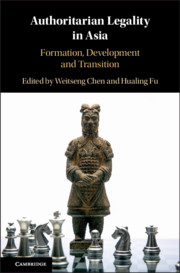Book contents
- Authoritarian Legality in Asia
- Authoritarian Legality in Asia
- Copyright page
- Contents
- Tables
- Notes on Contributors
- Acknowledgments
- Abbreviations
- Introduction Authoritarian Legality, the Rule of Law, and Democracy
- Part I Framework
- Part II Authoritarian Legality
- Part III Authoritarian Legality in Transition
- Authoritarian-Era Foundations for the Transition to Democracy
- 10 Preserving Constitutionalism by Changing the Constitution
- 11 Angels Are in the Details
- 12 Student Activism and Authoritarian Legality Transition in Taiwan
- Persistence of Authoritarian Legality after the Transition to Democracy
- Index
12 - Student Activism and Authoritarian Legality Transition in Taiwan
from Authoritarian-Era Foundations for the Transition to Democracy
Published online by Cambridge University Press: 14 July 2020
- Authoritarian Legality in Asia
- Authoritarian Legality in Asia
- Copyright page
- Contents
- Tables
- Notes on Contributors
- Acknowledgments
- Abbreviations
- Introduction Authoritarian Legality, the Rule of Law, and Democracy
- Part I Framework
- Part II Authoritarian Legality
- Part III Authoritarian Legality in Transition
- Authoritarian-Era Foundations for the Transition to Democracy
- 10 Preserving Constitutionalism by Changing the Constitution
- 11 Angels Are in the Details
- 12 Student Activism and Authoritarian Legality Transition in Taiwan
- Persistence of Authoritarian Legality after the Transition to Democracy
- Index
Summary
The transition of Taiwan’s authoritarian legality transformed not only the authoritarian rulers’ strategic commitment to law, but also the authoritarian regime itself. The experience of this transition resonates with those in other parts of the world in that civic activism is necessary for the transformation of authoritarian legality. This chapter suggests that student activism is one crucial dimension for understanding the dynamics of the authoritarian legality transition in Taiwan. Student activism in Taiwan is higher law-centric, institutionalized, and dialectic, with collaborative efforts across generations within and outside the legal system and the state apparatus. It blurs the boundary between the state and society as well as the one between social and student movements. However, common to many young democracies, this transition mechanism appears to be a slippery slope to populism, and thereby paradoxically weakens the function of positive law and the legislative body, especially amid heavily polarized politics. The post-transition struggles in this young democracy are similar to the democratic crises nowadays in the USA and Europe, where populism, divided society, and a growing tide of discontent toward liberalism and democracy have significantly diminished the functions of liberal and democratic legal institutions.
Keywords
- Type
- Chapter
- Information
- Authoritarian Legality in AsiaFormation, Development and Transition, pp. 303 - 334Publisher: Cambridge University PressPrint publication year: 2020
- 1
- Cited by



